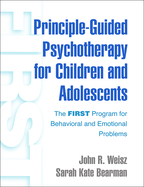Principle-Guided Psychotherapy for Children and Adolescents
The FIRST Program for Behavioral and Emotional Problems
John R. Weisz and Sarah Kate Bearman
“This fantastic volume synthesizes the last 50 years of evidence-based practice and offers a transdiagnostic set of principles that are based on our best science. This just may be the future of child and adolescent psychotherapy—and it sure would make training new clinicians a whole lot easier!”
—Mitchell J. Prinstein, PhD, ABPP, John Van Seters Professor of Psychology and Neuroscience, University of North Carolina at Chapel Hill
“This is an exciting resource from two highly accomplished experts in evidence-based treatments. Weisz and Bearman's seminal meta-analytic work has shown that 'smaller' treatments sometimes have bigger results. FIRST emphasizes efficiency, parsimony, and simplicity, while focusing on multiple problem types across a wide age range. It is at the vanguard of innovative designs that will characterize the future of evidence-based psychotherapy. This book is an excellent addition to the toolkit of anyone looking for a brief and flexible treatment approach for the most common youth mental health problems.”
—Bruce F. Chorpita, PhD, Department of Psychology, University of California, Los Angeles; President, PracticeWise
“In a non-cookbook fashion, Weisz and Bearman provide wise guidance for mental health professionals working with youth. The book shows how to apply FIRST to a variety of mental health problems facing youth. Features of specific disorders are considered and case examples are provided. The overall approach is transdiagnostic, but the authors offer guidance for individualization to specific cases. This book will be useful to beginning and experienced therapists alike, and could serve as stimulating reading in graduate coursework.”
—Philip C. Kendall, PhD, ABPP, Laura H. Carnell Professor of Psychology and Distinguished University Professor, Temple University
“This terrific book shows how psychological therapies should be conducted from now on. No more slavish adherence to one particular protocol or manual, no more rigid demarcation between narrowly defined therapies. The book sets out in practical steps how to synthesize fundamental therapeutic principles and apply them flexibly with children and adolescents. Each of the five core principles has been proven to work, but never before have they been put together in a way that is easy to understand and put into practice. The book will raise the game of both novice and expert therapists, challenging them to apply the very best treatment principles to whoever walks through the door.”
—Stephen Scott, CBE, FRCPsych, FMedSci, Institute of Psychiatry, Psychology, and Neuroscience, King’s College London, United Kingdom
Table of Contents
1. All about FIRST
2. Using FIRST and the FIRST Decision Trees to Treat Anxiety/OCD, Posttraumatic Stress, Depression, and Misbehavior
3. Beginning Treatment
4. Clinician Guides: Facts about the Problems Treated with FIRST
5. Help for Caregivers: Handouts on the Problems Treated with FIRST
- Think FIRST: Planning Treatment, Case by Case
- Summary Overview of the FIRST Treatment Program
6. Using the FIRST Principles: Feeling Calm
7. Using the FIRST Principles: Increasing Motivation
8. Using the FIRST Principles: Repairing Thoughts
9. Using the FIRST Principles: Solving Problems
10. Using the FIRST Principles: Trying the Opposite
11. Skill Units for Continuing Treatment, Boosting Engagement, and Ending Treatment
Appendix I. Published Studies Testing Independent Effects of the Five FIRST Principles
Appendix II. Sample Progressive Muscle Relaxation Script
Appendix III. Using FIRST for Panic Attacks and Tic/Habit Behaviors
Appendix IV. Frequently Asked Questions about Using FIRST in Clinical Practice
About the Authors
John R. Weisz, PhD, ABPP, is Professor of Psychology in the Department of Psychology at Harvard University, and at Harvard Medical School. He is a past president of the Society of Clinical Child and Adolescent Psychology and the International Society for Research in Child and Adolescent Psychopathology. Dr. Weisz is a recipient of the James McKeen Cattell Lifetime Achievement Award from the Association for Psychological Science, the Klaus Grawe Award for the Advancement of Innovative Research in Clinical Psychology and Psychotherapy from the Klaus Grawe Foundation in Switzerland, and the Sarah Gund Prize for Research and Mentorship in Child Mental Health from the Child Mind Institute’s Scientific Research Council. He served for 8 years as President and CEO of the Judge Baker Children’s Center, an affiliate of Harvard Medical School. Dr. Weisz’s research involves development and testing of psychotherapy programs for children and adolescents, particularly transdiagnostic approaches designed for implementation in clinical service settings, plus meta-analyses to characterize and inform psychotherapy research. His website is https://weiszlab.fas.harvard.edu.?Sarah Kate Bearman, PhD, is Assistant Professor in the School Psychology Program of the Department of Educational Psychology at The University of Texas at Austin (UT Austin), and Assistant Professor in the Department of Psychiatry at UT Austin’s Dell Medical School. A clinical child psychologist, she conducts research on factors that support the adoption, implementation, and sustainability of effective mental health services for children and families in complex, low-resource service settings. Dr. Bearman is especially interested in incorporating patient and provider perspectives in the development of interventions to increase goodness of fit, understanding the impact of training and supervision/consultation on psychotherapy, and increasing access to mental health services in nontraditional settings such as schools, child care, and primary care. Her website is https://sites.edb.utexas.edu/leap.
